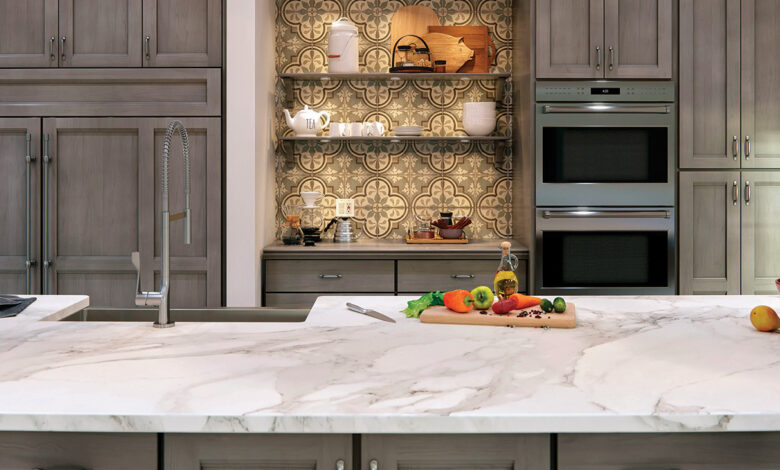The Beauty Of Porcelain Countertops: Timeless Elegance And Unmatched Durability

1. The Advantages of Porcelain Countertops
1.1 Unparalleled Durability
When it comes to durability, porcelain countertops from Caesarstone truly shine. Made from a combination of natural materials and cutting-edge technology, these countertops are designed to withstand the test of time. Porcelain is known for its exceptional strength and resistance to cracks and chips, making it an ideal choice for busy kitchens and high-traffic areas.
What sets porcelain countertops apart is their dense composition. They are engineered to be extremely hard, making them resistant to scratches, dents, and dings. This durability ensures that your countertop will maintain its beauty and functionality for years to come, even with daily use.
1.2 Stain and Scratch Resistance
In addition to their durability, porcelain countertops are also highly resistant to stains and scratches. The non-porous surface of porcelain prevents liquids, oils, and foods from penetrating the material, making it easy to clean up spills and messes. This feature is especially desirable in kitchen countertops, where spills are common and cleanliness is crucial.
Furthermore, the scratch-resistant nature of porcelain means that you don’t have to worry about knives, pots, or other kitchen utensils leaving their mark on your countertop. This is particularly important if you regularly prepare meals or entertain guests in your kitchen and want to maintain the pristine appearance of your countertops.
1.3 Heat and Cold Resistance
Porcelain countertops are not only durable and scratch-resistant, but they are also highly heat and cold resistant. This means that you can place hot pots and pans directly on the surface of the countertop without worrying about damage or discoloration. Similarly, porcelain countertops can withstand extreme cold temperatures without cracking or warping.
This heat and cold resistance makes porcelain countertops a practical choice for both indoor and outdoor kitchens. Whether you’re baking a delicious pie or enjoying a barbecue with friends, you can have peace of mind knowing that your countertop can handle the temperature extremes.
2. Aesthetic Appeal of Porcelain Countertops
2.1 Timeless Elegance
Porcelain countertops exude a timeless elegance that can elevate the look of any space. The smooth, polished surface of porcelain creates a sleek and sophisticated appearance that is both modern and classic. Whether you’re going for a contemporary kitchen design or a more traditional look, porcelain countertops will complement your aesthetic vision.
With its clean lines and minimalist appeal, porcelain showcases a simple yet refined beauty. Its versatility allows it to seamlessly blend with different styles and color schemes, making it a popular choice among designers and homeowners alike.
2.2 Versatile Design Possibilities
One of the major advantages of porcelain countertops is the wide range of design possibilities they offer. Unlike natural stone countertops, which are limited by the availability of certain colors and patterns in nature, porcelain can be manufactured in virtually any color or pattern.
Whether you prefer a classic white countertop, a bold and vibrant color, or a natural stone-like finish, porcelain can be customized to suit your personal taste and style. This versatility allows you to create a truly unique and personalized space that reflects your personality.
2.3 Unique Color and Pattern Options
Porcelain countertops offer a plethora of color and pattern options, providing endless opportunities for creativity and customization. From solid hues to marble-like veining and textured finishes, there is a wide range of choices to suit every design preference.
If you’re looking to add a touch of luxury to your kitchen, porcelain countertops can mimic the look of high-end materials such as marble or granite. With advancements in digital printing technology, manufacturers can replicate the intricate patterns and veining found in natural stone, giving you the aesthetic appeal without the cost and maintenance associated with it.
3. The Sustainable Choice: Environmental Benefits
3.1 Eco-Friendly Production Process
Choosing porcelain countertops not only enhances the aesthetics of your home but also contributes to a more sustainable future. The production process of porcelain countertops involves the use of natural raw materials, such as clay and feldspar, which are abundant and renewable resources.
Additionally, many manufacturers have adopted eco-friendly practices to minimize their impact on the environment. These include recycling water used in the production process, reducing waste, and using energy-efficient technologies. By opting for porcelain countertops, you are supporting companies that prioritize environmental sustainability.
3.2 Reduced Carbon Footprint
The carbon footprint of porcelain countertops is considerably lower compared to other countertop materials such as natural stone. The manufacturing process of porcelain requires less energy and emits fewer greenhouse gasses, making it a more environmentally friendly choice.
Furthermore, porcelain countertops have a longer lifespan compared to other materials. Their durability and resistance to wear and tear mean that they are less likely to be replaced frequently, reducing the environmental impact associated with manufacturing and transportation.
3.3 Long Lifespan and Recyclability
Porcelain countertops have an impressive lifespan, often lasting for decades with proper care and maintenance. Unlike other countertop materials that may need to be replaced every few years, porcelain countertops can withstand the test of time, saving you money and reducing waste.
Moreover, at the end of their life cycle, porcelain countertops can be recycled. The crushed porcelain can then be used as an aggregate in the production of new countertops or other construction materials, minimizing the amount of waste that ends up in landfills.
4. Practical Considerations for Porcelain Countertops
4.1 Maintenance and Cleaning Tips
Maintaining and cleaning porcelain countertops is relatively simple. Regular dusting and wiping with a soft cloth or sponge, along with mild soap and warm water, are usually sufficient to keep them looking their best.
It’s important to avoid using abrasive cleaners or scrub brushes that can potentially damage the surface of the countertop. Additionally, it’s recommended to clean up spills promptly to prevent staining, although porcelain’s stain-resistant nature ensures that most spills can be easily wiped away.
4.2 Cost Comparison and Budget Planning
While porcelain countertops offer numerous benefits, it’s essential to consider the cost when planning your budget. Porcelain countertops generally fall in the mid-range to high-end price category, depending on the manufacturer, design, and installation requirements.
However, it’s important to note that the long lifespan and low maintenance needs of porcelain countertops can offset their initial cost. Additionally, their durability can prevent costly repairs or replacements down the line, making them a cost-effective choice in the long run.
4.3 Installation Challenges and Professional Advice
Installing porcelain countertops can be a complex process that requires precision and expertise. Due to their heavy and fragile nature, it’s recommended to hire a professional installer with experience in working with porcelain.
A professional installer will ensure that the countertops are properly supported and leveled to prevent cracking or breakage. They will also handle any necessary adjustments or cutouts for sinks, faucets, and appliances, ensuring a seamless and secure installation.
It’s advisable to consult with multiple professionals and ask for references to ensure that you choose a reputable and experienced installer who can provide guidance and insight specific to your project.
FAQ
Question: What makes porcelain countertops durable?
Answer: Porcelain countertops are known for their exceptional strength and resistance to cracks, chips, scratches, and dents. They are made from a combination of natural materials and cutting-edge technology, resulting in a dense composition that ensures their durability.
Question: Are porcelain countertops resistant to stains and scratches?
Answer: Yes, porcelain countertops are highly resistant to stains and scratches. The non-porous surface of porcelain prevents liquids, oils, and foods from penetrating the material, making them easy to clean. Additionally, the scratch-resistant nature of porcelain ensures that the countertops maintain their pristine appearance even with daily use.
Question: Can porcelain countertops withstand heat and cold?
Answer: Yes, porcelain countertops are highly heat and cold resistant. They can handle the direct placement of hot pots and pans without damage or discoloration. Similarly, they can withstand extreme cold temperatures without cracking or warping, making them suitable for both indoor and outdoor kitchens.
Question: Are porcelain countertops versatile in terms of design?
Answer: Absolutely. Porcelain countertops offer a wide range of design possibilities. Unlike natural stone countertops, porcelain can be manufactured in virtually any color or pattern. Whether you prefer a classic white countertop or a bold and vibrant color, porcelain can be customized to suit your personal style and vision.
Question: What are the environmental benefits of porcelain countertops?
Answer: Choosing porcelain countertops is an eco-friendly choice. The production process involves the use of natural raw materials and many manufacturers have adopted sustainable practices to minimize their impact on the environment. Additionally, porcelain countertops have a reduced carbon footprint and can be recycled at the end of their life cycle.
Question: How do you maintain and clean porcelain countertops?
Answer: Maintaining and cleaning porcelain countertops is relatively simple. Regular dusting and wiping with a soft cloth or sponge, along with mild soap and warm water, are usually sufficient to keep them looking their best. It’s important to avoid using abrasive cleaners or scrub brushes that can potentially damage the surface.
Question: How does the cost of porcelain countertops compare to other materials?
Answer: Porcelain countertops generally fall in the mid-range to high-end price category. While they may have a higher initial cost, their long lifespan and low maintenance needs can offset this expense. Additionally, their durability can prevent costly repairs or replacements in the future.
Question: Should professional installation be considered for porcelain countertops?
Answer: Yes, professional installation is recommended for porcelain countertops due to their heavy and fragile nature. A professional installer will ensure that the countertops are properly supported and leveled, preventing cracking or breakage. They will also handle any necessary adjustments or cutouts for sinks, faucets, and appliances, ensuring a seamless and secure installation.
Useful Resources:
- Caesarstone – The official website of Caesarstone, the manufacturer of porcelain countertops
- HGTV – A popular home and lifestyle television network with articles and videos on kitchen countertop materials
- This Old House – A trusted source for home improvement projects, including articles on countertop options
- Bob Vila – Home improvement expert Bob Vila’s website, featuring tips and advice on kitchen renovation
- Architectural Digest – A renowned architecture and design magazine with informative articles on countertop materials
- Consumer Reports – A resource for unbiased reviews and ratings on various products, including kitchen countertops
- Green Home Guide – A website dedicated to sustainable and eco-friendly home improvement, including information on environmentally friendly countertop materials
- The Family Handyman – A website offering DIY home improvement guides and tutorials, including countertop installation tips


